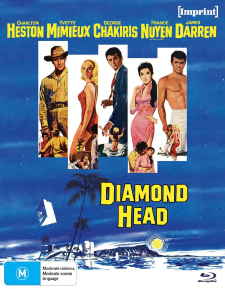Diamond Head (Blu-ray Review)

Director
Guy GreenRelease Date(s)
1962 (November 29, 2023)Studio(s)
Columbia Pictures (Imprint/Via Vision)- Film/Program Grade: A-
- Video Grade: A-
- Audio Grade: A
- Extras Grade: F
Review
Generally solid, Diamond Head (1962) is a one of star Charlton Heston’s lesser-known films from the period, which is odd because this is a slick, big-scale and dramatically ambitious production that mostly holds up well. Its biggest problem is that it can’t quite decide whether it wants to be a serious drama about topical issues or just an entertaining romantic melodrama.
In 1959, as Hawaii prepares to join the Union as its 50th state, hard-headed, swaggering, white colonial land baron Richard “King” Howland (Heston) is asked to run for one of Hawaii’s first two U.S. Senate seats. The idea appeals to him but there are several problems. His kid sister, Sloane (Yvette Mimieux), plans to marry Paul Kahana (James Darren), a native Hawaiian, a marriage vehemently opposed by King, who wants a “pure” white heir to his vast land holdings, he having lost his own wife and son to a tsunami some years back. The film also vaguely hints at a kind of incestuous possessiveness on the part of all-controlling King.
Further, King himself is a hypocrite, as he’s having a longstanding love affair with Asian Mai Chen (France Nuyen), who discovers that she’s pregnant with his child. King obviously has feelings for Mai Chen but wants no part of their child and refuses to marry her. Ensnared in this web of romantic intrigue is Mai Chen’s brother, Bobby (Marc Marno), who wants to blackmail politically ambitious King; and Paul’s more stable (but still native Hawaiian) doctor brother Dean (George Chakiris), who also loves Sloane.
The picture raises myriad interesting issues, never digging very deeply on any of them. King lords over a changing Hawaii that outwardly suggests blissful harmony among its various races but which, in reality, is rife with unspoken racism and segregation. King and his sister-in-law, Laura Beckett (Elizabeth Allen, the creepy department store sales lady in the famous Twilight Zone episode The After Hours) belong to a whites-only country club. King himself bluntly expresses to anyone who’ll listen that it’s fine to sleep with “the natives,” but don’t marry one. King is a manipulating, conceited control freak who seems to want Sloane for himself, perhaps not sexually, and with Mai Chen wants to have his cake and eat it, too.
The role of King was intended for the King of Hollywood, Clark Gable, who died before the film got going, and so Heston replaced him. As Gable was a generation older than Heston, the part of Sloane was changed from his daughter to his much younger sister, which in turn changed the dynamic of that relationship some, though Mimieux, 20 at the time but with her baby-fatted features and doe-like innocence, looks even younger. He acting abilities were pretty limited when she started in movies while still a teenager in the late-1950s, but she steadily improved and by this point and is able to pull off a fairly complex character.
Heston, of course, excelled playing larger-than-life historical and biblical characters, less so playing more ordinary people in contemporary parts, though he could be excellent in Westerns. Diamond Head calls for a combination of types, an emotionally aloof, confident white colonial type, but also a modern-day man with modern-day problems. Heston greatly admired director Guy Green but later expressed regret that Green didn’t push him hard enough. He’s right about that in the sense that Heston’s swagger should have been dialed back a notch—at times he’s almost like Marc Antony in Shakespeare—and Green should have pushed Heston for an emotional reality that just isn’t there but needs to be. King plays his cards too close to the chest; in several key scenes Heston allows too little emotional turmoil come through. He’s just too hardened a tough guy.
The racial angle falls in line with earlier films like Sayonara (1957), exploring similar themes adequately but never quite reaching their potential, likewise King’s unhealthy relationship with Slone. Undercutting the former is the now-dated use of white actors playing Hawaiians: Italian-American Darren, Greek-American Chakiris and, of all people, Aline MacMahon as Kapiolani Kahana, the sage den-mother of the local Hawaiian community. Nevertheless, both Darren and especially Chakiris are quite good in their roles.
Filmed in Panavision, Green makes excellent use of the attractive locations, and King and Sloane get around in some fab (and now vintage) sports cars and private planes. This was one of John Williams’s first big film scores, though it’s disappointingly conventional.
Imprint’s no-frills Blu-ray presents the film in 1080p widescreen, preserving the original 2.35:1 aspect ratio. The transfer seems old to my eyes. It’s decently sharp and impressive overall, but the color timing is a little wobbly at times and there’s minor damage here and there, including a big reel change cue just as “The End” appears onscreen. The LPCM 2.0 mono is acceptable and the optional English subtitles are provided on this Region-Free disc. No extras at all, however. Odd.
Diamond Head isn’t perfect but it is rather strong for what it is, maintaining the viewer’s interest throughout with its strong performances and scenery. Recommended.
- Stuart Galbraith IV

